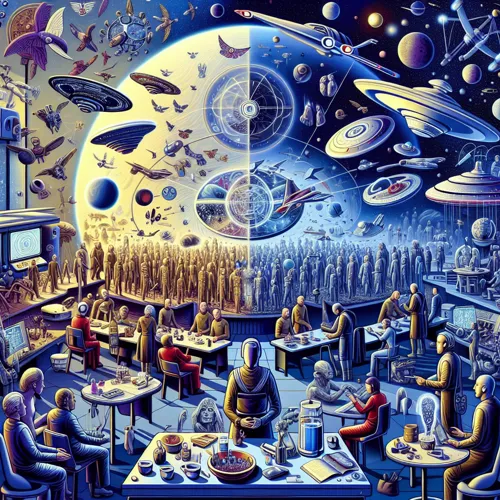When Star Trek: The Original Series debuted in 1966, the world was on the cusp of profound change. It’s creator, Gene Roddenberry, envisioned a future where humans had overcome their deepest divisions and united as a single species, bound together by a sense of common purpose, respect, and empathy towards all forms of sentient life.
From its inception, the show was an ambitious exploration of human society, politics, technology, and morality through the lens of a sprawling future spacefaring civilization known as Starfleet. Its impact on television, science fiction, and society cannot be understated; it provided commentary and foresight that has since influenced numerous subsequent works in film and literature.
In this post, we shall explore the hidden social critics, hopes, and solutions embedded within the show’s narrative fabric, uncovering themes that continue to resonate today. Our discussion will encompass five key areas: equality, technological progress, ecology and sustainability, international relations, and morality and values.
Equality: The Voyage towards a Unified Humanity
The Federation’s founding ideals, as laid out by Starfleet, were premised on the fundamental principles of justice, fairness, and equality. From the moment we first stepped aboard the USS Enterprise under Captain Kirk, we saw that Roddenberry intended to challenge society’s complacency and bias. By including characters like Lieutenant Uhura, Lt. Sulu, Dr. McCoy, Mr. Spock, and others representing diverse backgrounds, races, species, and beliefs, he offered a vision of an egalitarian society built on shared goals and aspirations.
Technological Progress: Harnessing the Powers of Tomorrow
Another theme woven throughout The Original Series is the potential benefits and risks of technological advancement. The crew of the Enterprise encountered countless societies who struggled to reconcile their fear or excitement towards technology with its potential uses and consequences. Roddenberry’s vision for the future was that humankind could embrace change while still maintaining its core moral compass, using advanced technologies as tools for bettering life across the galaxy.
Ecology and Sustainability: The Need to Coexist Peacefully
The Original Series also grappled with ecological concerns, illustrating both the beauty and fragility of our natural world. The episode “The Devil in the Dark” famously featured an encounter between the crew and a seemingly malevolent entity known as a Horta; however, their true motives were revealed to be defensive - they were merely protecting their own young from intruders who wished to exploit their mineral resources without regard for sustainability.
International Relations: A United Front Against Threats
In The Original Series, humanity’s unity is put to the test time and again as the Federation confronts both internal challenges (such as rogue factions) and external threats from powerful alien entities who pose existential dangers. Despite these obstacles, we witness how diplomacy can forge alliances even with those considered hostile or different, reinforcing Roddenberry’s vision of cooperation over conflict.
Morality and Values: Facing Ethical Dilemmas in a Changing Galaxy
Finally, one could argue that perhaps the most important theme running throughout The Original Series is moral fortitude. Starfleet’s crews often faced dilemmas that tested their commitment to justice, truth, and compassion. From Captain Kirk wrestling with the ethics of first contact to Dr. McCoy grappling with medical triage scenarios, we were constantly reminded that while technology may offer us unprecedented power, it also places immense responsibilities upon our shoulders - responsibilities for how we treat one another, other species, and indeed, ourselves.
In conclusion Star Trek: The Original Series serves as an enduring beacon of hope for a brighter tomorrow grounded in human values, intellectual curiosity, empathy, and cooperation. As society continues its march into an uncertain future filled with challenges both familiar and unprecedented, these timeless lessons remain more relevant than ever before.
